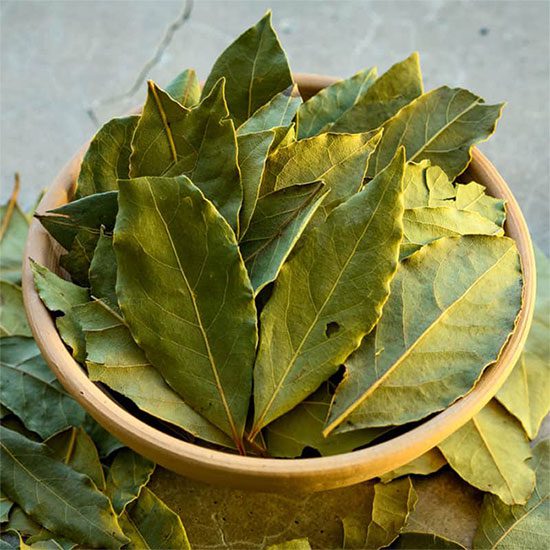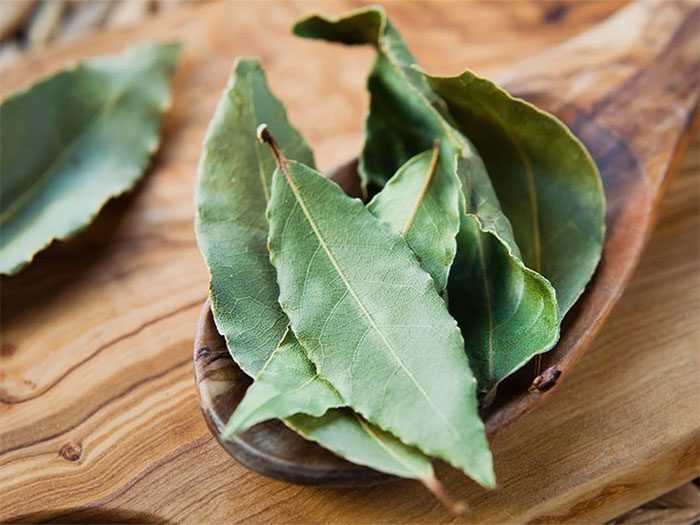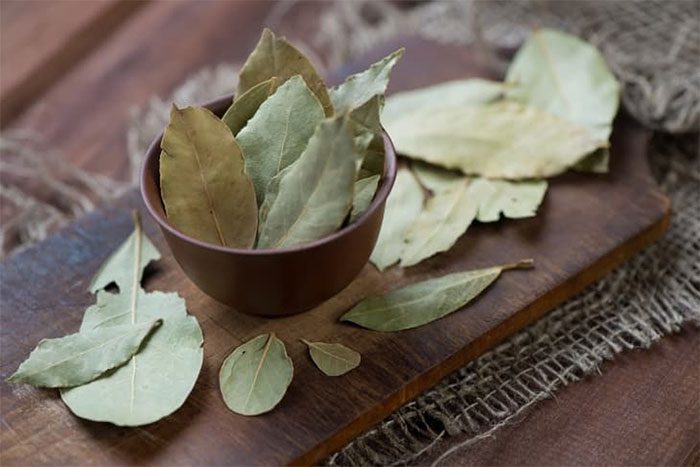Bay Laurel, scientifically known as Laurus nobilis L., belongs to the Lauraceae family. Dried bay leaves are commonly used to flavor soups, stews, and sauces. Beyond being a spice, this herb is also known for its numerous health benefits.
What are Bay Leaves?
1. Nutritional Value and Chemical Composition of Bay Leaves
Nutritional Value: Bay leaves are a source of vitamins A, C, B6, calcium, iron, and manganese. A tablespoon of crushed bay leaves contains:
- 5.5 calories
- Protein: 0.1 g
- Fat: 0.1 g
- Carbohydrates: 1.3 g
Bay leaves also contain small amounts of various vitamins and minerals, most notably:
- Calcium
- Copper
- Iron
- Magnesium
- Manganese
- Vitamin A
- Vitamin B6
- Vitamin C
- Riboflavin
- Zinc
Chemical Composition: Bay leaves contain tannins, flavonoids, alkaloids, eugenol, linalool, methyl chavicol, and anthocyanins.

Bay leaves contain antioxidants. (Image: Internet).
2. Health Benefits of Bay Leaves
Numerous studies have been conducted to explore the effects of bay leaves. Below are 8 potential and notable health benefits of bay leaves.
2.1. Good for Diabetics
According to a 2008 study, taking capsules containing 1–3 grams of bay leaves daily can help reduce and control glucose and cholesterol levels in people with diabetes. This is likely due to the polyphenols, which are powerful antioxidants found in bay leaves.
However, some evidence suggests that this herb could hinder blood sugar control.
2.2. Improves Digestion
Bay leaves are a good spice for digestive health by preventing stomach damage and promoting urination. This helps release toxins from the body and supports kidney health. Furthermore, organic compounds found in bay leaves are effective in alleviating stomach pain, reducing irritable bowel syndrome, or even aiding in the digestion of food.

Bay leaves are good for digestion, helping to reduce irritable bowel syndrome. (Image: Internet).
2.3. Treats Respiratory Conditions
Bay leaves are also a source of essential oils. The essential oil extracted from the leaves of this spice can be used to alleviate some respiratory ailments.
2.4. May Help Prevent Cancer
Some studies indicate that bay leaves may help inhibit the growth of breast and colorectal cancer cells. However, these findings are preliminary and not yet conclusive, necessitating further research in humans to confirm this effect of bay leaves.
Additionally, according to the Journal of Nutritional Research, the combination of antioxidants and organic compounds in bay leaves, including phytonutrients, catechin, linalool, and parthenolide, helps protect your body from the effects of cancer-causing free radicals.
2.5. May Prevent Kidney Stones
A 2014 study found that 8 other traditional herbs, along with bay leaves, can reduce the amount of urease in the body.
Urease is an enzyme that, when imbalanced, can lead to various gastric disorders, including kidney stones.
Much like the research on cancer prevention, studies on bay leaves for preventing kidney stones also require further investigation to draw accurate conclusions.

Bay leaves help reduce urease levels, preventing kidney stones. (Image: Internet).
2.6. Helps Reduce Stress and Anxiety
Bay leaves contain linalool, which may reduce stress and anxiety levels in the body. Furthermore, this compound has natural calming properties, helping you relax and lowering the risk of depression.
2.7. Protects Cardiovascular Health
The heart tends to function better thanks to rutin and caffeic acid, both found in bay leaves. These properties may strengthen the heart’s capillaries and help lower bad cholesterol levels.
2.8. Good for Hair
Bay leaves contain many properties that can benefit your hair and promote hair growth. You can soak bay leaves in water and rub them on your scalp after washing your hair to eliminate dandruff.
3. How to Use and Precautions When Using Bay Leaves
Usage: Fresh bay leaves have a bitter and pungent taste, so they should be dried before use. You can buy them pre-dried or sun-dry fresh leaves. You can also use a food processor or coffee grinder to grind dried bay leaves into powder.
As a spice, you can add bay leaves to various dishes, such as:
- Stewing with beef
- Marinating meat before grilling or frying
- Adding to soups or phở broth
- Mixing with various herbs like garlic, mustard, pepper, parsley, rosemary, thyme, and mint.
Additionally, you can brew it into tea to enjoy, as bay leaf tea is excellent for the stomach.
Precautions: Avoid eating fresh leaves or consuming large amounts as bay leaves can be hard to chew and digest. There is insufficient research on the effects of using bay leaves as medicine during pregnancy or breastfeeding; therefore, it is advisable to consult a doctor before use.
Moreover, bay leaves can affect the central nervous system (CNS) when combined with anesthetics and other medications used during and after surgery. Hence, you should discontinue use at least 2 weeks before surgery or consult your doctor.




















































